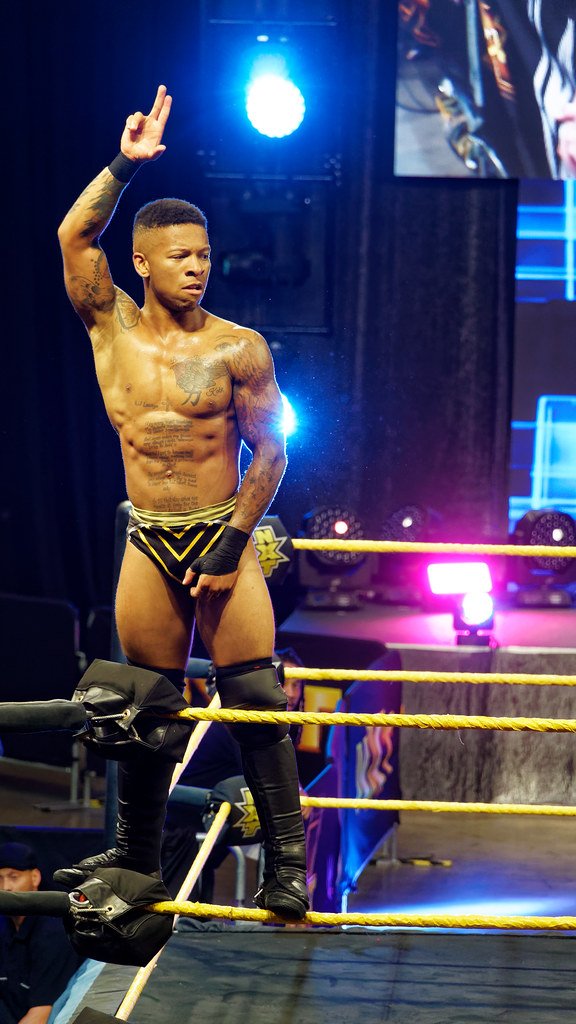By Karli Korszeniewski
Anti-Blackness has always existed in the professional wrestling industry, and still does, says Dewitt King, a UC Chancellor’s Postdoctoral Fellow in Film and Media Studies at UC Irvine.
King recently told a UC Santa Barbara audience there are different types of wrestlers: technical wrestlers, who are considered strategically smart, and Black wrestlers who are considered to be explosive, high energy, or really strong types.
“Black wrestlers are not allowed to be technical wrestlers,” King said at a recent lecture hosted by UCSB’s Department of Film and Media Studies titled “Grappling with Abandonment: OnlyFans and the Libidinal Economies of Pro Wrestling.” OnlyFans is a popular online platform for subscription-based video content, featuring mainly sex workers but also musicians and fitness coaches. Pro-wrestling has recently become prominent on OnlyFans.
Dewitt King, UC Chancellor’s Postdoctoral Fellow in Film and Media Studies at UC Irvine, talked about the pro wrestling industry, as a guest of UCSB’s Department of Film and Media Studies.
Dewitt King trained as a professional wrestler from age 17 to 19. He is an interdisciplinary Black Studies scholar and recently received his Ph.D. from the University of Minnesota with a dissertation on Blacks in professional wrestling. He writes about black culture, sports media industries, and racialization in labor and the economy.
King said he views anti-Blackness in wresting through the gimmicks, the common typecasts or categories that Black wrestlers are limited to, such as “angry” or “happy and dancing.” He also examines the selection process—who is being booked to perform in shows.
“When I think about the anti-Blackness in pro wrestling, I see it through the gimmicks but also in who actually gets to be the booker,” he said.
There are few to no Black owned pro wrestling companies, which means the majority of Black pro wrestlers rely on a booker to give them screen time, King said.
“There’s no ownership,” King said. “Being booked is being put on shows. A lot of Black wrestlers are always overlooked, that’s how the anti-Blackness manifests in there. No matter how hard they work, no matter what they do, they aren’t booked or they never win the championship.”
To illustrate how Black wrestlers are ignored, he told the story of Lio Rush, the first major wrestler from World Wrestling Entertainment, or WWE, to join OnlyFans.
Lionel Gerald Green, known professionally as Lio Rush, is a wrestler and musician currently signed to Impact Wrestling, an American professional wrestling promoter based in Tennessee. Rush and his history with OnlyFans started with the COVID-19.
Popular pro wrestler Lio Rush in 2018. Photo by Miguel Discart, Flickr
Most pro wrestling companies reside in Florida, a state which declared them essential businesses in March 2020, and many fans believed the industry wouldn’t be affected by the global pandemic. Still, these companies released about 19 wrestlers from their contracts in 2020, and by 2022 about 133 wrestlers had lost their business deals, with no financial protection.
King explained that wrestlers are considered independent contractors, meaning companies like the WWE are not obligated to provide unemployment compensation, social security, insurance, worker’s compensation, medical, disability, etc.
Lio Rush was among the 19 wrestlers in 2020 to be let go from their WWE contracts. Despite winning numerous titles and being popular among the crowd, he was not quickly picked up by another wrestling company.
“Remember, wrestling is just like everything else; racial hierarchies are still present,” King said. “So, he did not get picked up by another company. And that’s pretty much a pattern. “
Rush was surprised by his layoff and used social media to express his worries about providing for his family. He focused on a music career and made his first studio album. His second album hinted at him quitting wrestling but to the surprise of many fans, he returned to independent wrestling, mainly in Japan and Mexico.
Still struggling to get back to the income level he had known with the WWE, Rush announced in October 2020 that he would be joining OnlyFans. He only stayed on the platform for three to four months, but his short time there prompted many other wrestlers to follow in his footsteps.
King said that pro wrestling has always had sex-based economies connected to the industry, such as is the case with the current popularity of OnlyFans, which hosts sex subscriptions. He cited the sale of used gear, whereby female/male pro wrestlers sell items they’ve been wearing to fans who buy the gear for their own pleasure.
Another example of sexualization in the industry comes in the form of “custom” matches, which he described as “overtly sexualized spectacles,” in which viewers purchase games where they can choose the moves, storylines, and dialogue and even determine what the wrestlers wear—such as skimpier than usual trunks.
UCSB’s Department of Film and Media Studies recently hosted Black Studies scholar Dewitt King, who answered questions as part of the event .
King’s next project will explore how sports industry profiteers consider individual athletes disposable — especially Black athletes — and how race plays a role.
Karli Korszeniewski is a second-year Film and Media Studies major at UC Santa Barbara. She is a Web and Social Media Intern with the Division of Humanities and Fine Arts.




